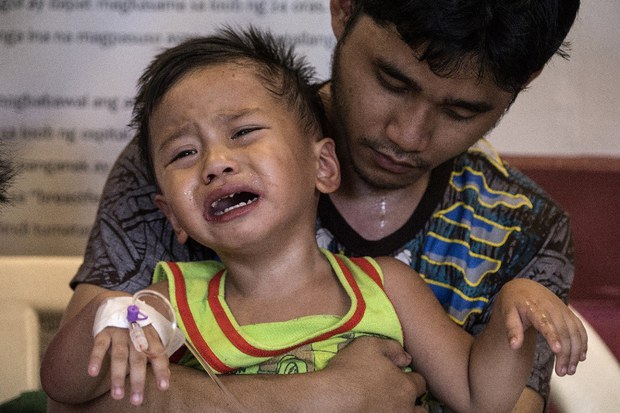Philippines Declares Dengue Epidemic as Number of Cases Tops 146,000
2019.08.06
Iligan, Philippines
 Kyle Valdez, 2, cries as his father hugs him at the East Avenue Medical Center in Manila after health authorities said the boy began experiencing early symptoms of dengue, March 5, 2018.
Kyle Valdez, 2, cries as his father hugs him at the East Avenue Medical Center in Manila after health authorities said the boy began experiencing early symptoms of dengue, March 5, 2018.
The Philippines declared a nationwide dengue epidemic on Tuesday as deaths linked to the mosquito-borne disease hit 622 this year, health officials said.
Authorities recorded more than 146,000 dengue cases from January to July 20 this year, or a 98 percent jump from the same period last year, Health Secretary Francisco Duque III said.
“It is important that a national epidemic be declared in these areas to identify where a localized response is needed and to enable the local government units to use their Quick Response Fund to address the epidemic situation,” Duque said, referring to provinces with thousands of recorded cases.
Dengue fever and dengue hemorrhagic fever are acute viral infections that are known to affect infants, young children and adults. It is transmitted by a bite from an Aedes aegypti mosquito infected with any one of the four dengue strains.
Last week, Chris Staines, head of the International Federation of Red Cross and Red Crescent Societies (IFRC), appealed for urgent action to contain deadly dengue, adding the country is experiencing an alarming number of cases.
“We need to work together to save lives and contain the outbreak, which we fear will worsen during the monsoon rains,” Staines said.
“Dengue can be stopped in its tracks, but families need to protect themselves from mosquito bites and seek medical treatment if they experience any symptoms, such as high fever, headaches, nausea and joint pains,” he said.
Warning signs of severe dengue occur three to seven days after the first symptoms and include severe abdominal pain, persistent vomiting, bleeding gums, fatigue, restlessness and blood in vomit. Proper medical care is needed to avoid complications and risk of death, health officials said.
In its July 25 report, the World Health Organization cited the dengue caseload was expected to significantly rise because of the delayed rainy season caused by a weak El Niño season.
“The risk for the dengue outbreak in the Philippines to spread to other countries in the region is assessed low, although some cases from travelers to the Philippines are expected, but this is likely to be limited,” the WHO report said.
It noted that Dengvaxia, manufactured by French firm Sanofi Pasteur, is the only dengue vaccine licensed globally, but it has been banned in the Philippine since December 2017. At least 14 Filipino children died out of more than 800,000 inoculated between 2016 and 2017, Philippine health officials said.
The vaccine was administered to tens of thousands of school children in the Southeast Asian country, but was discontinued after the firm said it caused severe infections among those who were vaccinated but had not previously contracted the disease. However, a Sanofi regional director told a Philippine congressional panel in 2018 that the drug was safe for public use.
The WHO said severe dengue was recognized in the 1950s during epidemics in the Philippines and Thailand. The Philippine government declared an initial “dengue alert” in July.
Earlier this year, the government blamed an uptick in measles cases on its immunization program suffering a setback following the Dengvaxia vaccine scare in late 2017.
Following an appeal from health practitioners to lift the ban against Dengvaxia, presidential spokesman Salvador Panelo said the government was open to allowing the use of the vaccine again upon recommendation from experts.
“That has to be discussed thoroughly and extensively. We need experts to support any call for the return of Dengvaxia,” Panelo said in response to a proposal by Iloilo Rep. Janette Garin, a former health secretary, to make the vaccine available anew to the public.
“We’re always open to anything that will benefit the Filipino people,” Panelo said. “We’re not closed to any suggestion.”
Jeoffrey Maitem in Cotabato City contributed to this report.







